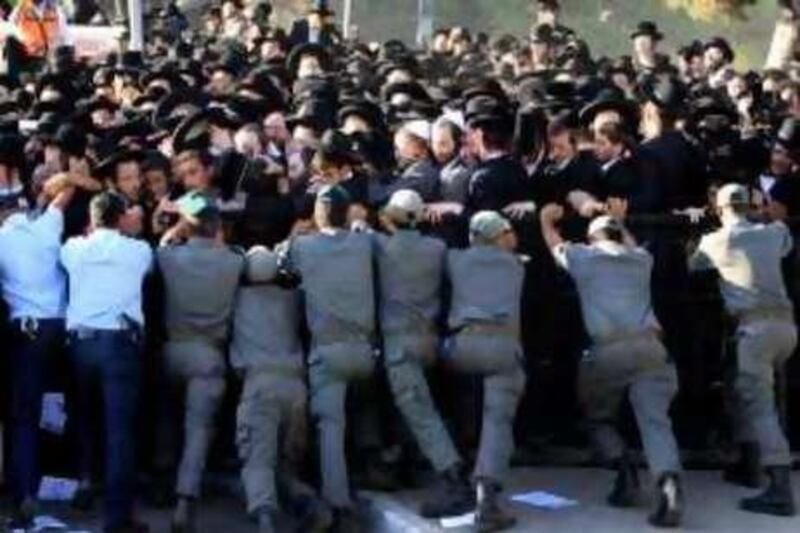JERUSALEM // Two dozen strictly religious Jews, 22 of them women, were on the run from the Israeli police yesterday, as the country faced a rapidly escalating confrontation between the secular courts and the small but powerful ultra-Orthodox community. On Thursday, neighbourhoods of Jerusalem had turned black with the distinctive traditional dress of more than 100,000 ultra-Orthodox, also known as haredim, as they protested against a decision to send 86 members of their community to prison for contempt of court. Demonstrators' placards read: "Fascist judges" and "Yes to the Bible, no to the court".
The crisis has been provoked by a Supreme Court ruling against segregation at a publicly funded haredi school, enforced through partition walls in the classrooms and playground, designed to keep girls from different ethnic backgrounds apart. The court says the separation is racist, while the haredim claim it is to ensure more strictly observant girls are not made "impure". The ruling, which raises larger questions about the weak separation of state and religion in Israel, risks provoking a violent backlash from the ultra-Orthodox, about one-tenth of the population, who claim their way of life is under threat from secular institutions.
The judgment also comes in the wake of other recent court decisions threatening to strip the ultra-Orthodox of long-standing privileges resented by secular Israelis but which successive governments have been reluctant to oppose because of the need for support from haredi parties. Anshel Pfeffer, an analyst with the liberal Haraetz newspaper, said the politicians "can do the political maths. Prime Minister Benjamin Netanyahu will lose his coalition if he is seen in any way to be supporting government interference in haredi schools."
Friction between the courts and the haredim has been growing on a number of fronts, including recent rulings that remove an exemption from military service enjoyed by most ultra-Orthodox men and that end special income benefits that allow 10,000 young men to study the Bible without working. The 700,000 haredim - whose growth rate is the highest in the country, with an average of seven children per family - have also angered secular Israelis with evermore confident displays of their political and social power.
They stage regular, and often violent, protests to stop building work in areas they deem ancient burial sites, to prevent government officials entering their communities, to stop firms and public institutions opening on the sabbath, and to enforce separation between men and women on public buses passing though their communities. But strains have been deepest over the haredi education system, which is run with virtually no oversight from the state but is mostly paid for from the public purse. Secular Israelis view the schools, which educate one-fifth of Israeli children but spurn modern subjects in favour of religious studies, as being largely responsible for the high levels of poverty among the haredim and their failure to integrate into mainstream society.
Tensions have come to a head, however, over practices at a single school in the West Bank settlement of Immanuel, near Nablus, and home to about 3,000 haredim. The Supreme Court ruled nearly a year ago that segregation at the girls' junior school must end immediately. A partition wall had been erected to separate haredi children, largely on the basis of differences in ethnic background. Ashkenazic families, whose ancestry is European, claim they are more strictly observant than their Sephardic neighbours, who originally came from the Middle East, North Africa and the Iberian peninsula, and that mixing may harm the Ashkenazic girls. Nationally, about one-fifth of haredim are believed to be Sephardic.
After the wall was removed, 43 Ashkenazic couples withdrew their daughters from school. Last week the court ordered that the parents serve a fortnight in jail, until the school year ends. But 22 women and two men were reported to have gone into hiding. Police applied for arrest warrants yesterday but, to avoid further confrontation as the sabbath rapidly approached, the courts postponed deliberations until tomorrow.
Several haredi rabbis have compared the court's decision to the Nazis' persecution of Jews. Shmuel Brazovsky, Immanuel's spiritual leader, said: "Taking women, mothers to small children, making them leave their entire family and arresting them ? has not happened since the end of the war." However, the ruling appears to have aroused mixed feelings in Shas, the largest ultra-Orthodox party, which chiefly represents the Sephardic haredim whose rights the court is defending.
Shas ministers have followed Rabbi Ovadia Yosef, their spiritual leader, in deploring the secular courts' interference in haredi affairs, though they refrained from calling on their followers to demonstrate in support of the jailed families. Yair Ettinger, a commentator in Haaretz, noted that the Sephardic leadership was uncomfortable at being seen on the wrong side of confrontation lines. All haredim would prefer a state founded on Halacha, or Jewish religious law.
Mr Netanyahu has so far remained studiously quiet on the issue. The government is assumed to prefer a compromise, such as bulding a new school in Immanuel. Yesterday Yehuda Weinstein, the attorney general, sent a letter asking the Supreme Court to refrain from enforcing the jail sentences on the 22 mothers. foreign.desk@thenational






